NB-IoT provider OQ Technology moves to next Arianespace Vega mission
Tuesday, 19 September 2023 14:35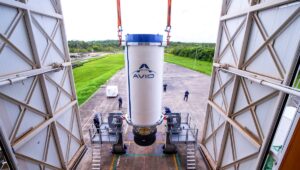
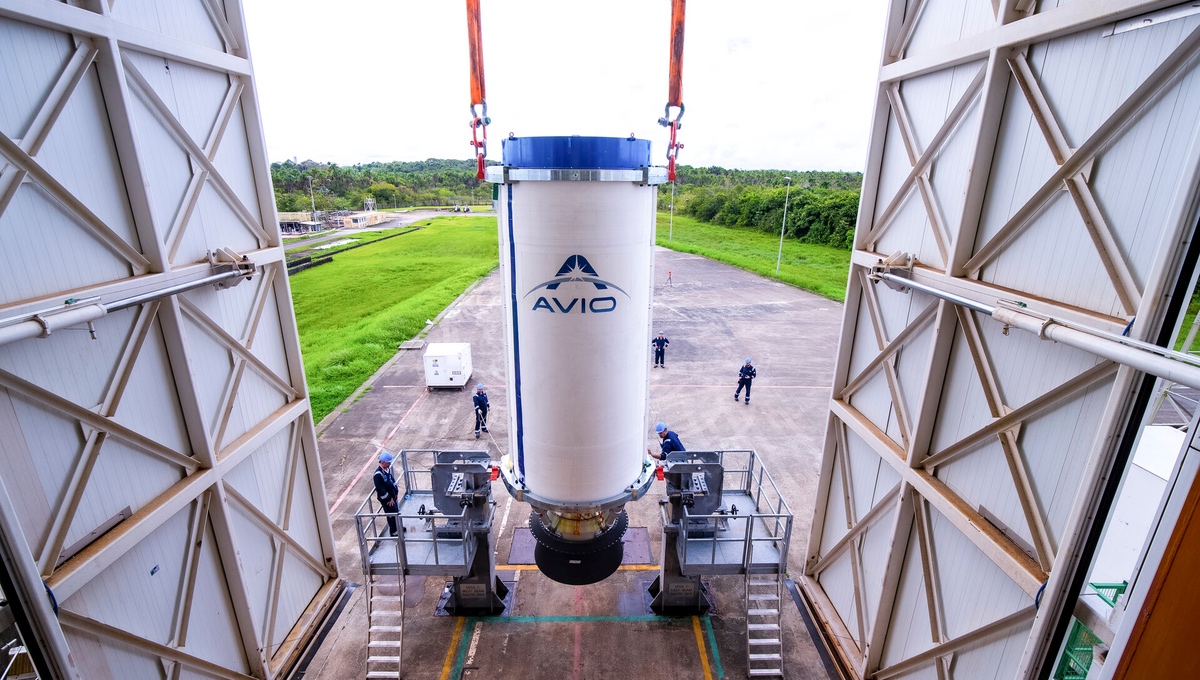
Public Invited to NASA’s Goddard Visitor Center to Celebrate Historic Asteroid Sample Delivery
Tuesday, 19 September 2023 13:00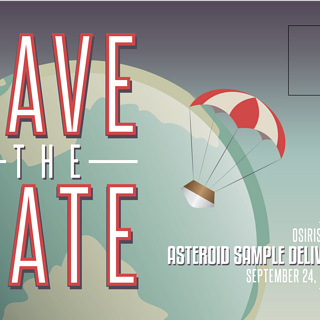 The public is invited to a watch party at NASA’s Goddard Visitor Center, Greenbelt, Maryland to celebrate the first U.S. mission, OSIRIS-REx, to collect a sample from an asteroid and deliver it to Earth on Sept. 24, 2023.
The public is invited to a watch party at NASA’s Goddard Visitor Center, Greenbelt, Maryland to celebrate the first U.S. mission, OSIRIS-REx, to collect a sample from an asteroid and deliver it to Earth on Sept. 24, 2023. Kayhan raises $7 million and offers autonomous traffic-coordination service
Tuesday, 19 September 2023 12:00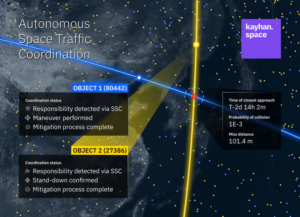
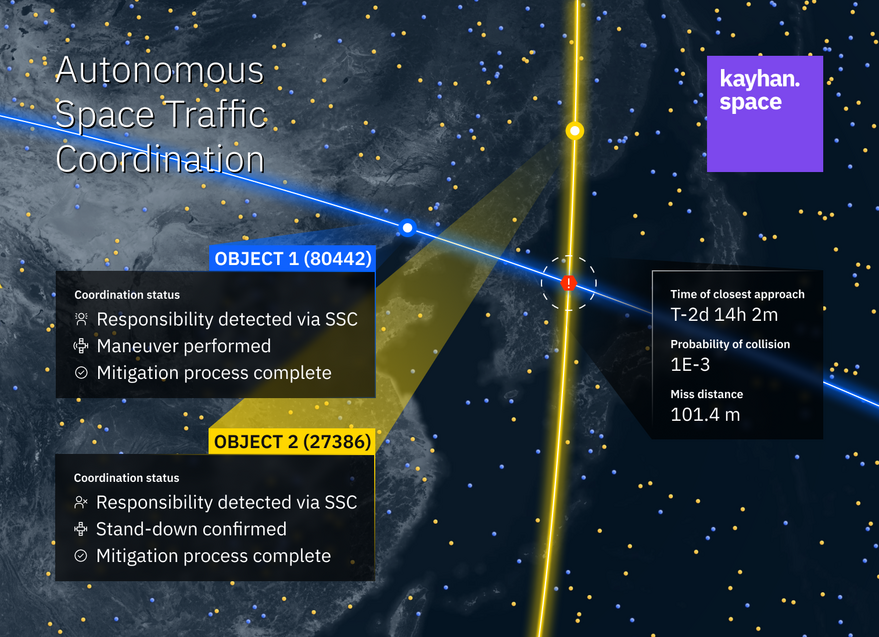
Firefly Aerospace launches US Space Force VICTUS NOX Responsive Space Mission with 24-hours notice
Tuesday, 19 September 2023 09:34
Vandenberg AFB CA (SPX) Sep 18, 2023
 Firefly Aerospace, an end-to-end space transportation company, today announced the company successfully launched its Alpha rocket and deployed the VICTUS NOX spacecraft following a 24-hour notice to complete final payload operations and mission preparations.
Led by U.S. Space Force Space Systems Command's (SSC) Space Safari Program Office and in close partnership with the Rocket Systems La
Firefly Aerospace, an end-to-end space transportation company, today announced the company successfully launched its Alpha rocket and deployed the VICTUS NOX spacecraft following a 24-hour notice to complete final payload operations and mission preparations.
Led by U.S. Space Force Space Systems Command's (SSC) Space Safari Program Office and in close partnership with the Rocket Systems La
 Firefly Aerospace, an end-to-end space transportation company, today announced the company successfully launched its Alpha rocket and deployed the VICTUS NOX spacecraft following a 24-hour notice to complete final payload operations and mission preparations.
Led by U.S. Space Force Space Systems Command's (SSC) Space Safari Program Office and in close partnership with the Rocket Systems La
Firefly Aerospace, an end-to-end space transportation company, today announced the company successfully launched its Alpha rocket and deployed the VICTUS NOX spacecraft following a 24-hour notice to complete final payload operations and mission preparations.
Led by U.S. Space Force Space Systems Command's (SSC) Space Safari Program Office and in close partnership with the Rocket Systems La PLD SPACE signs a MOU with WISeKey to launch ultra-secure satellites with MIURA 5
Tuesday, 19 September 2023 09:34
Elche, Spain (SPX) Sep 15, 2023
 PLD Space, the company that designs, develops, manufactures and operates Europe's first private launcher, signs an agreement with WISeSat.Space, a subsidiary of WISeKey International Holding Ltd., the global leader in cybersecurity, AI, Blockchain and IoT, to launch the next generation of ultra-secure sub-500 kg satellites for Quantum-Ready Internet of Things (IoT) communications with the MIURA
PLD Space, the company that designs, develops, manufactures and operates Europe's first private launcher, signs an agreement with WISeSat.Space, a subsidiary of WISeKey International Holding Ltd., the global leader in cybersecurity, AI, Blockchain and IoT, to launch the next generation of ultra-secure sub-500 kg satellites for Quantum-Ready Internet of Things (IoT) communications with the MIURA
 PLD Space, the company that designs, develops, manufactures and operates Europe's first private launcher, signs an agreement with WISeSat.Space, a subsidiary of WISeKey International Holding Ltd., the global leader in cybersecurity, AI, Blockchain and IoT, to launch the next generation of ultra-secure sub-500 kg satellites for Quantum-Ready Internet of Things (IoT) communications with the MIURA
PLD Space, the company that designs, develops, manufactures and operates Europe's first private launcher, signs an agreement with WISeSat.Space, a subsidiary of WISeKey International Holding Ltd., the global leader in cybersecurity, AI, Blockchain and IoT, to launch the next generation of ultra-secure sub-500 kg satellites for Quantum-Ready Internet of Things (IoT) communications with the MIURA Picogrid releases smallest AI-Enabled Command Station deployable in minutes
Tuesday, 19 September 2023 09:34
Los Angeles CA (SPX) Sep 15, 2023
 Picogrid has taken the wraps off its latest innovation: Helios. This state-of-the-art hardware will be in the spotlight at the U.S. Army Military Police Regimental Association Conference at Fort Leonard Wood, MO.
Contained within a single, man-portable hard-shell case, Helios is a rapidly deployable platform that integrates high-bandwidth multi-network communications, onboard computing, an
Picogrid has taken the wraps off its latest innovation: Helios. This state-of-the-art hardware will be in the spotlight at the U.S. Army Military Police Regimental Association Conference at Fort Leonard Wood, MO.
Contained within a single, man-portable hard-shell case, Helios is a rapidly deployable platform that integrates high-bandwidth multi-network communications, onboard computing, an
 Picogrid has taken the wraps off its latest innovation: Helios. This state-of-the-art hardware will be in the spotlight at the U.S. Army Military Police Regimental Association Conference at Fort Leonard Wood, MO.
Contained within a single, man-portable hard-shell case, Helios is a rapidly deployable platform that integrates high-bandwidth multi-network communications, onboard computing, an
Picogrid has taken the wraps off its latest innovation: Helios. This state-of-the-art hardware will be in the spotlight at the U.S. Army Military Police Regimental Association Conference at Fort Leonard Wood, MO.
Contained within a single, man-portable hard-shell case, Helios is a rapidly deployable platform that integrates high-bandwidth multi-network communications, onboard computing, an Will Sino-US space competition stop at Mars
Tuesday, 19 September 2023 09:34
Beijing (XNA) Sep 15, 2023
 While attending a conference in the United States recently, I overheard an American expert discussing the space competition between China and the US. After the event, I approached the expert to inquire about the possibility of space cooperation between the two countries. His answer is a matter of concern. He explained that as long as the US Congress doesn't withdraw the ban it announced in 2011,
While attending a conference in the United States recently, I overheard an American expert discussing the space competition between China and the US. After the event, I approached the expert to inquire about the possibility of space cooperation between the two countries. His answer is a matter of concern. He explained that as long as the US Congress doesn't withdraw the ban it announced in 2011,
 While attending a conference in the United States recently, I overheard an American expert discussing the space competition between China and the US. After the event, I approached the expert to inquire about the possibility of space cooperation between the two countries. His answer is a matter of concern. He explained that as long as the US Congress doesn't withdraw the ban it announced in 2011,
While attending a conference in the United States recently, I overheard an American expert discussing the space competition between China and the US. After the event, I approached the expert to inquire about the possibility of space cooperation between the two countries. His answer is a matter of concern. He explained that as long as the US Congress doesn't withdraw the ban it announced in 2011, Bayanat teams with HySpecIQ and AzurX for enable hyperspectral imaging for UAE
Tuesday, 19 September 2023 09:34
Abu Dhabi, UAE (SPX) Sep 15, 2023
 HySpecIQ, a global leader in hyperspectral imaging and data analytics, hsa announced a partnership with Bayanat, an ADX-listed public company and leading provider of AI-powered geospatial solutions.
Hyperspectral imaging is a powerful technology that enables identification of objects from space. It takes advantage of the fact that all objects reflect light, both visible and beyond, in a un
HySpecIQ, a global leader in hyperspectral imaging and data analytics, hsa announced a partnership with Bayanat, an ADX-listed public company and leading provider of AI-powered geospatial solutions.
Hyperspectral imaging is a powerful technology that enables identification of objects from space. It takes advantage of the fact that all objects reflect light, both visible and beyond, in a un
 HySpecIQ, a global leader in hyperspectral imaging and data analytics, hsa announced a partnership with Bayanat, an ADX-listed public company and leading provider of AI-powered geospatial solutions.
Hyperspectral imaging is a powerful technology that enables identification of objects from space. It takes advantage of the fact that all objects reflect light, both visible and beyond, in a un
HySpecIQ, a global leader in hyperspectral imaging and data analytics, hsa announced a partnership with Bayanat, an ADX-listed public company and leading provider of AI-powered geospatial solutions.
Hyperspectral imaging is a powerful technology that enables identification of objects from space. It takes advantage of the fact that all objects reflect light, both visible and beyond, in a un GOES-U completes environmental testing
Tuesday, 19 September 2023 09:34
Greenbelt MD (SPX) Sep 15, 2023
 GOES-U, the fourth and final satellite in NOAA's GOES-R Series of advanced geostationary satellites, recently completed rigorous testing to ensure it can withstand the harsh conditions of launch and orbiting in space 22,236 miles above Earth.
The testing process spanned nearly a year. During thermal vacuum testing, completed in November 2022, GOES-U was placed in a large 29-foot wide by 65
GOES-U, the fourth and final satellite in NOAA's GOES-R Series of advanced geostationary satellites, recently completed rigorous testing to ensure it can withstand the harsh conditions of launch and orbiting in space 22,236 miles above Earth.
The testing process spanned nearly a year. During thermal vacuum testing, completed in November 2022, GOES-U was placed in a large 29-foot wide by 65
 GOES-U, the fourth and final satellite in NOAA's GOES-R Series of advanced geostationary satellites, recently completed rigorous testing to ensure it can withstand the harsh conditions of launch and orbiting in space 22,236 miles above Earth.
The testing process spanned nearly a year. During thermal vacuum testing, completed in November 2022, GOES-U was placed in a large 29-foot wide by 65
GOES-U, the fourth and final satellite in NOAA's GOES-R Series of advanced geostationary satellites, recently completed rigorous testing to ensure it can withstand the harsh conditions of launch and orbiting in space 22,236 miles above Earth.
The testing process spanned nearly a year. During thermal vacuum testing, completed in November 2022, GOES-U was placed in a large 29-foot wide by 65 Satellogic and SkyWatch increase access to timely earth observation data
Tuesday, 19 September 2023 09:34
Paris, France (SPX) Sep 15, 2023
 Satellogic Inc. (NASDAQ: SATL), has announced at World Satellite Business Week, their partnership to bring the highest resolution commercially available EO data to EarthCache customers.
Satellogic's EO data is now available via SkyWatch's EarthCache platform. EarthCache provides an intuitive interface and robust API that enables customers to browse archive data, as well as task new satelli
Satellogic Inc. (NASDAQ: SATL), has announced at World Satellite Business Week, their partnership to bring the highest resolution commercially available EO data to EarthCache customers.
Satellogic's EO data is now available via SkyWatch's EarthCache platform. EarthCache provides an intuitive interface and robust API that enables customers to browse archive data, as well as task new satelli
 Satellogic Inc. (NASDAQ: SATL), has announced at World Satellite Business Week, their partnership to bring the highest resolution commercially available EO data to EarthCache customers.
Satellogic's EO data is now available via SkyWatch's EarthCache platform. EarthCache provides an intuitive interface and robust API that enables customers to browse archive data, as well as task new satelli
Satellogic Inc. (NASDAQ: SATL), has announced at World Satellite Business Week, their partnership to bring the highest resolution commercially available EO data to EarthCache customers.
Satellogic's EO data is now available via SkyWatch's EarthCache platform. EarthCache provides an intuitive interface and robust API that enables customers to browse archive data, as well as task new satelli Showcase your climate data visualisation talent with ESA
Tuesday, 19 September 2023 09:34
Paris (ESA) Sep 15, 2023
 Are you a creative visionary with a passion for climate action? Enter ESA's latest competition to showcase your talent by transforming decades of satellite climate data into impactful visuals to help bridge the gap between climate science, policy makers and the wider public. The winner will have the unique opportunity to display their data visualisation at the 2023 United Nations Climate Change
Are you a creative visionary with a passion for climate action? Enter ESA's latest competition to showcase your talent by transforming decades of satellite climate data into impactful visuals to help bridge the gap between climate science, policy makers and the wider public. The winner will have the unique opportunity to display their data visualisation at the 2023 United Nations Climate Change
 Are you a creative visionary with a passion for climate action? Enter ESA's latest competition to showcase your talent by transforming decades of satellite climate data into impactful visuals to help bridge the gap between climate science, policy makers and the wider public. The winner will have the unique opportunity to display their data visualisation at the 2023 United Nations Climate Change
Are you a creative visionary with a passion for climate action? Enter ESA's latest competition to showcase your talent by transforming decades of satellite climate data into impactful visuals to help bridge the gap between climate science, policy makers and the wider public. The winner will have the unique opportunity to display their data visualisation at the 2023 United Nations Climate Change Spire Global selected by Estuaire to monitor and reduce aviation emissions
Tuesday, 19 September 2023 09:34
Vienna VA (SPX) Sep 18, 2023
 Spire Global was selected by Estuaire, a data firm empowering the aviation industry to reduce its environmental impact, to supply global aviation insights. Spire will provide its detailed aircraft positional data, as well as its Flight Report, which aggregates hundreds of millions of daily satellite and terrestrial ADS-B positions into an easily accessible one-row-per-flight information enriched
Spire Global was selected by Estuaire, a data firm empowering the aviation industry to reduce its environmental impact, to supply global aviation insights. Spire will provide its detailed aircraft positional data, as well as its Flight Report, which aggregates hundreds of millions of daily satellite and terrestrial ADS-B positions into an easily accessible one-row-per-flight information enriched
 Spire Global was selected by Estuaire, a data firm empowering the aviation industry to reduce its environmental impact, to supply global aviation insights. Spire will provide its detailed aircraft positional data, as well as its Flight Report, which aggregates hundreds of millions of daily satellite and terrestrial ADS-B positions into an easily accessible one-row-per-flight information enriched
Spire Global was selected by Estuaire, a data firm empowering the aviation industry to reduce its environmental impact, to supply global aviation insights. Spire will provide its detailed aircraft positional data, as well as its Flight Report, which aggregates hundreds of millions of daily satellite and terrestrial ADS-B positions into an easily accessible one-row-per-flight information enriched SynMax announces acquisition of Gas Vista in energy and maritime intelligence push
Tuesday, 19 September 2023 09:34
Houston TX (SPX) Sep 18, 2023
 SynMax, a pioneering geospatial intelligence company, announced the successful acquisition of Gas Vista, a premier maritime energy trade flow analytics and visualization company renowned for its innovative LNG product, Leviaton. This strategic acquisition stems from Gas Vista's advanced technological capabilities, deep industry knowledge, and impressive network. Their core competencies perfectly
SynMax, a pioneering geospatial intelligence company, announced the successful acquisition of Gas Vista, a premier maritime energy trade flow analytics and visualization company renowned for its innovative LNG product, Leviaton. This strategic acquisition stems from Gas Vista's advanced technological capabilities, deep industry knowledge, and impressive network. Their core competencies perfectly
 SynMax, a pioneering geospatial intelligence company, announced the successful acquisition of Gas Vista, a premier maritime energy trade flow analytics and visualization company renowned for its innovative LNG product, Leviaton. This strategic acquisition stems from Gas Vista's advanced technological capabilities, deep industry knowledge, and impressive network. Their core competencies perfectly
SynMax, a pioneering geospatial intelligence company, announced the successful acquisition of Gas Vista, a premier maritime energy trade flow analytics and visualization company renowned for its innovative LNG product, Leviaton. This strategic acquisition stems from Gas Vista's advanced technological capabilities, deep industry knowledge, and impressive network. Their core competencies perfectly Moon crew visits European powerhouse
Tuesday, 19 September 2023 09:00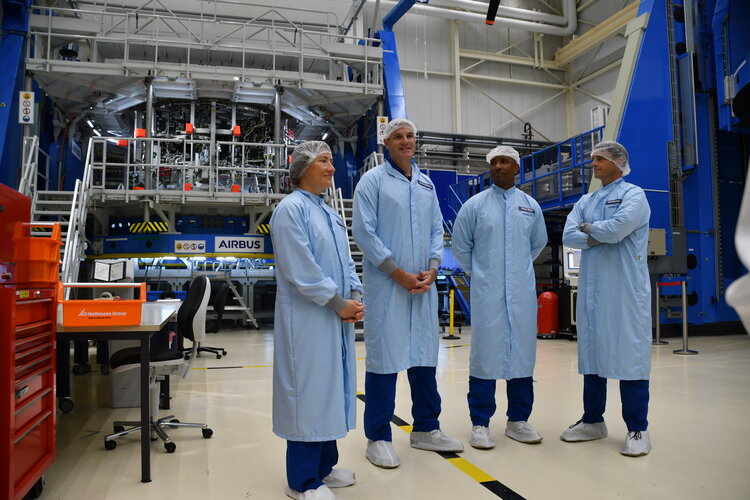 Image:
From left: the Artemis II astronauts, Christina Koch, Jeremy Hansen, Victor Glover, and Reid Wiseman, visited the European Service Module (ESM) assembly hall at Airbus in Bremen, Germany, last week.
Image:
From left: the Artemis II astronauts, Christina Koch, Jeremy Hansen, Victor Glover, and Reid Wiseman, visited the European Service Module (ESM) assembly hall at Airbus in Bremen, Germany, last week. 
